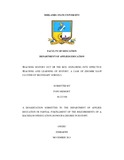Please use this identifier to cite or link to this item:
https://cris.library.msu.ac.zw//handle/11408/2497| Title: | Teaching history out of the box: exploring into effective teaching and learning of history, a case of Zhombe east cluster of secondary schools | Authors: | Fofo, Memory | Keywords: | History Core subjects Zimbabwean secondary schools |
Issue Date: | Nov-2015 | Publisher: | Midlands State University | Abstract: | History is a core subjects studied in Zimbabwean secondary schools from form one to form four. History is also studied at Advanced level as an Art subject. Students who proceed to tertiary education especially technical and teachers colleges are obliged to study National Strategies Studies which takes its components from the History subject. Hence the study of History at secondary level provides a concrete foundation for these students. Thus the subject need to be taught and learnt effectively since its impact is far and abroad for all people have history and need a historical background in one way or the other. The subject is of paramount importance since it fosters the sense of identity and augers their critical and analytical skills. In addition, the subject clearly shows the learners where they are coming from, where they are, where they would be going economically, socially and politically as a people. In this light the researcher was motivated to make a critical conceptualization of the current History teaching and learning methodologies so as to make sure that this noble subject is taught effectively in secondary schools. The study employed the descriptive survey research design. The target population would be 730 respondents consisting of 10 schools and heads, 20 history teachers at O level and 700 form 4 pupils in 2015 enrolment in Zhombe East Cluster of secondary schools in Kwekwe District, Midlands Province. Random Sampling was used to select school heads and pupils. Purposive Sampling was also used to select History teachers. Instruments for collecting data from teachers and pupils included questionnaires, interviews schedules administered to school heads and also observation of lessons by the researcher .Document analysis guides was also used to check on records done and kept by history teachers. Data collected was then presented, interpreted and analysed .This was done using descriptive statistics after data cleaning and coding. Quantitative data was analyzed using the frequency counts, means and percentages while qualitative data was presented by tallying the numbers of similar responses. Results of all data analysis were presented using frequency distribution tables, bar graphs and pie charts. Major recommendations were the need to depoliticize History, using learner centred pedagogies, aids from NGOs, old students association and the government to cheap in funding teaching and learning of History and the ongoing professional development for History teachers so as to cover the gaps towards an improved approach.. | URI: | http://hdl.handle.net/11408/2497 |
| Appears in Collections: | Bachelor Of Education Honours Degree In History |
Show full item record
Page view(s)
114
checked on Feb 26, 2025
Download(s)
62
checked on Feb 26, 2025
Google ScholarTM
Check
Items in MSUIR are protected by copyright, with all rights reserved, unless otherwise indicated.



